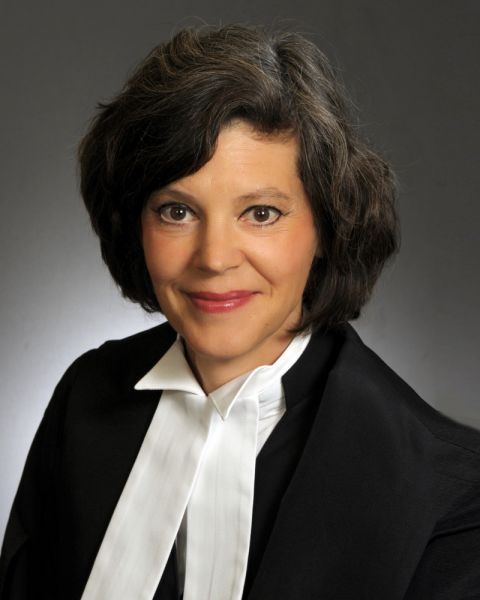
Following a distinguished 13-year judicial career on the province’s Superior Court, Justice Julie Thorburn, Law’88, has been appointed to the Court of Appeal for Ontario. Among her many career highlights, she has been a partner with a Bay Street firm; served terms as Chair of the Ontario Bar Association’s media and communications law section, and as Director of the International Association of Women Judges and President of its Canadian Chapter; and co-authored the Report to the Attorney General of Ontario, Enhancing Access to Justice in French.
Now into her third month on the bench of Ontario’s appeal court, she discusses her experiences on the two courts and at Queen’s Law, and shares advice for students and lawyers interested in pursuing careers in the judiciary.
What do you find most rewarding as a justice of the Court of Appeal for Ontario?
The teamwork. At the Superior Court, while I had the assistance of law clerks and staff, I was essentially deciding cases on my own. What I find really interesting is that on the Court of Appeal, there are three of us hearing an issue together, that we then have the opportunity to discuss and (for the most part) decide together. It is fascinating to learn from one another and see how different people view issues, styles of advocacy and arrive at decisions.
What did you like best about serving on the Superior Court of Ontario?
Just as we were focusing more and more on specialization in the profession, I had the opportunity to broaden my horizons. I heard cases in the areas of commercial law, criminal law, family law and civil litigation before becoming the administrative judge of the Divisional Court, which deals with appeals of interlocutory decisions of the Superior Court.
The Superior Court was also an opportunity for me to see the people and hear the stories that provide the context for our legal questions, that give meaning to the law, and what we do as judges.
What are you most proud of in your career?
Relationships. I have loved the problem-solving and the strategic planning involved in building a case or developing my reasons for decision. But what I have loved most is the people I have met, the stories I heard and the things I have learned with and from them: from my law clerks, to my junior lawyers, to those whose cases I have heard and to the mentors I was lucky to have met and who helped me along the way.
What advice would you give law students and lawyers interested in judicial careers?
- Be resilient. We don’t always talk about it, but we have all faced setbacks. There are people and experiences that disappoint, but never give up if this is something you really want.
- Find a mentor. There are people out there willing, able and interested to help you. Seek them out, ask for help and tell them how much you appreciate their assistance.
- Be flexible and think of the long game. Law firms, what they do and how they do it are changing rapidly. Take the time to think about what the opportunities of tomorrow will be and prepare yourself for them.
How did Queen’s Law prepare you for your career?
When I came to Queen’s Law, I was the only opera singer in my class. I was very lucky to have had professors like David Mullan, John Whyte and Dan Soberman who noticed people like me who didn’t quite fit the mould. I have a clear recollection of feeling like I just wouldn’t be able to make this work and John Whyte took me aside and told me that I could. I remember Dan Soberman telling me that I should put my name out there and pursue mooting as I spoke English and French and could argue in both – which I have done many times since! And David Mullan was a great mentor and moot coach, and has become a great friend over the years. He is not just a terrific scholar but a warm person.
Queen’s offers a very personal environment with a real concern about students and their well-being.